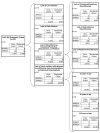SPRED 1 mutations in a neurofibromatosis clinic
- PMID: 20179001
- PMCID: PMC3243064
- DOI: 10.1177/0883073809359540
SPRED 1 mutations in a neurofibromatosis clinic
Abstract
Legius syndrome, caused by SPRED1 mutations, has phenotypic overlap with neurofibromatosis type 1 (NF1) without tumorigenic manifestations. Patients fulfilling the National Institutes of Health (NIH) diagnostic criteria for NF1 were enrolled at the University of Utah NF Clinic, and SPRED1 mutation analysis was performed to identify the frequency of Legius syndrome within an NF1 clinic population. SPRED1 sequencing was performed on 151 individuals with the clinical diagnosis of NF1, and 2 individuals (1.3%) were found to have novel SPRED1 mutations, p.R18X and p.Q194X. The phenotypes for the 2 individuals with SPRED1 mutations included altered pigmentation without tumorigenesis. A specific SPRED1 haplotype allele was identified in 27 individuals. The frequency of SPRED1 mutations in patients meeting diagnostic criteria for NF1 in a hospital-based clinic is 1% to 2%. The likelihood an individual is harboring a SPRED1 mutation increases with age if multiple, nonpigmentary NF1 findings are absent. Legius syndrome patients may benefit from altered medical surveillance.
References
-
- Stevenson DA, Swensen J, Viskochil DH. Neurofibromatosis type 1 and other syndromes of the Ras pathway. In: Kaufmann D, editor. Neurofibromatoses. Monographs in Human Genetics. Vol. 16. Basel; Karger: 2008. pp. 32–45.
-
- Brems H, Chmara M, Sahbatou M, et al. Germline loss-of-function mutations in SPRED1 cause a neurofibromatosis 1-like phenotype. Nat Genet. 2007;39(9):1120–1126. - PubMed
-
- Pasmant E, Sabbagh A, Hanna N, et al. SPRED1 germline mutations caused a neurofibromatosis type 1 overlapping phenotype. J Med Genet. 2009;46(7):425–430. - PubMed
-
- Spurlock G, Bennett E, Chuzhanova N, et al. SPRED1 mtuations (Legius syndrome): another clinically useful genotype for dissecting the NF1 phenotype. J Med Genet. 2009;46(7):431–437. - PubMed
-
- Neurofibromatosis Conference statement. National Institutes of Health Consensus Development Conference. Arch Neurol. 1988;45:575–578. - PubMed
Publication types
MeSH terms
Substances
Supplementary concepts
Grants and funding
LinkOut - more resources
Full Text Sources
Research Materials
Miscellaneous




